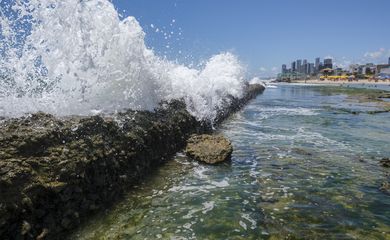Brazil: Fernando de Noronha reefs face menace of plastic pollution

The coral reefs of Fernando de Noronha and the archipelago of São Pedro and São Paulo, two sets of Brazilian oceanic islands, both boasting rich biodiversity, are facing a threat—plastic waste and discarded fishing gear.

A study carried out by Hudson Pinheiro, a researcher affiliated with the University of São Paulo (USP) and the Nature Conservation Experts Network (RECN), has revealed that these two reef environments are among those with the highest amounts of garbage, alongside reefs in the Comoros (West Africa) and the Philippines.
"We used to dive in these places, thinking we were going to explore a completely unknown environment, but in fact there was already evidence of human impact in these regions, with a lot of garbage and fishing gear," the researcher revealed.
Both plastic waste and neglected fishing gear pose risks to marine life. Animals often mistake plastic for food, leading to suffocation or intoxication, while discarded fishing gear, such as lines, nets, and hooks, continues its lethal impact even on the ocean floor, a phenomenon termed "ghost fishing." Pinheiro emphasizes the detrimental effect of such equipment entangling and breaking corals when stuck on reefs.
The researcher advocates for a fundamental reevaluation of society's plastic usage and urges fishermen to adopt biodegradable materials to mitigate the persisting impact of abandoned gear on marine ecosystems.
Fishing
Beyond the environmental challenge posed by waste, Pinheiro sheds light on the extensive fishing activity threatening coral biodiversity. Fishing waste discovered on these remote reefs, far from the coastline, underscores the prevalence of commercial fishing in these areas.
Pinheiro notes a “recurring pattern where fishermen, upon discovering rich fishing grounds, exploit these environments to the point of exhausting commercial species.”
A poignant example is the overfishing of snapper (Lutjanus purpureus) in Fernando de Noronha during the 1960s and 1970s, leading to the species' disappearance.
Similarly, in São Pedro and São Paulo, sharks were targeted in the 70s and 80s, resulting in a significant decline in the local reef shark population.
Pinheiro, however, highlights a positive shift in the last 10 years, as measures banning shark fishing have allowed the gradual recovery of these marine species.
Despite their remoteness from the Brazilian continental coast, these findings suggest that the impact on coastal reefs, spanning from Bahia state to Rio Grande do Norte state, might be even more severe, Pinheiro believes.





